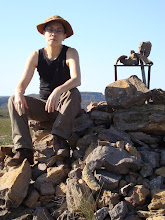I have just posted on Facebook about the recently released report, Meat Eater's Guide to Climate Change and Health.
Thanks to our friends at the Environmental Working Group, who have produced a very clever little chart which shows us which meats (and animal "products") have the most environmental impact.
Of course this somewhat misses the point, as there are matters of nutrition and ethics to consider. In that respect, any consumption of conventionally-produced food is going to have not just an environmental impact, but major impacts on human health and nutrition plus the attendant ethical issues relating to how these animals are treated.
You would think that it would be easier to simply switch to eating vegan wholefoods. But no. And then enter stage left, George Monbiot with a comment on this book which he read recently. Meat: a benign extravagance, by Simon Fairlie discusses the view that feedlot cattle, fed on grains is not the most effective and efficient way to raise cattle. We knew that. But then he goes on to explain that pigs raised for eating are also deprived of their natural diet (and a few other things that are natural to pigs). If we were to fix this, not only would we be better off in relation to our carbon footprint, but we could - as it were - have our meat and eat it. Not sure that i would want to pursue this path, but i can see how it must make my fellow meat-eaters feel 100% more comfortable about their food behaviours.
All of this is intertwixtedley implicated in how we approach permaculture design solutions. it is an ongoing conversation in the more enlightened of permaculture circles as to how an integrated permaculture design can meet human needs without compromising the needs of (exploiting) non-human animals. Simon Fairlie's view is clearly coloured by his experiences on a permaculture settlement. Interesting. I wonder why he won't name which permaculture community it was.
Sunday photoblogging: East Street
3 days ago





